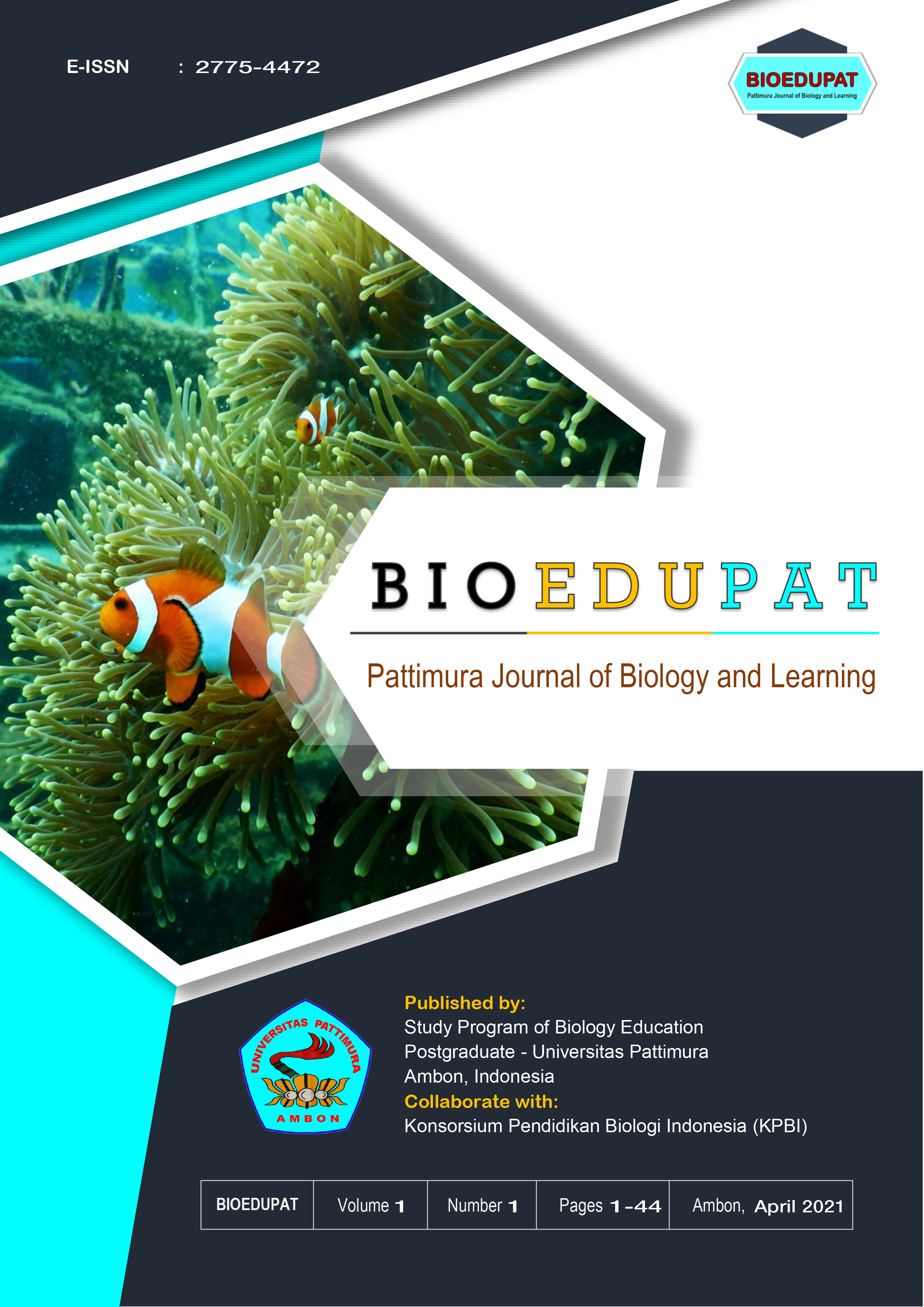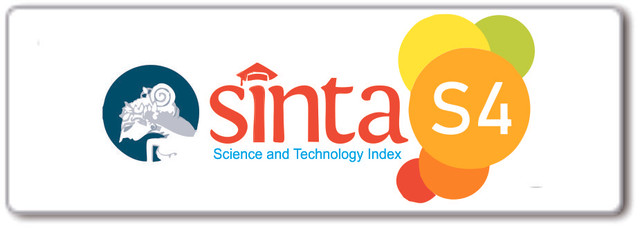Problem-based learning model: Its application and effect on learning outcomes
Abstract
The problem-based learning model is a model that plans a problem that is given by educators to be solved by students. This PBL learning model has learning conditions oriented to concrete problems. This research aimed to determine the effect of the problem-based learning (PBL) model on the learning outcomes of class VIII students on Plant Motion Material at MTs Al-Muhajirin Waihatu. The type of research used in this research is descriptive quantitative analyzed using inferential statistics. This research was conducted for three months starting from August 10 to October 10, 2020. The location of this research was carried out in class VIII on Plant Motion Material at MTs Al-Muhajirin Waihatu with a sample of 90 students. To analyze the data obtained through questionnaires and test results, students were processed using descriptive analysis with the SPSS 20 application. The results showed that the application of the problem-based learning (PBL) learning model to the learning outcomes of students in plant motion reached the final qualifications of students (Test Formative) describes 90 students (100%) who succeeded in achieving the MCC value (minimum completeness criteria). The problem-based learning model has a significant effect on the learning outcomes of class VIII students of MTs Al-Muhajirin Waihatu, this can be seen from the significant level of 0.626 with the strong category
Downloads
References
Arikunto, S. (2010). Metode peneltian. Rineka Cipta, Jakarta.
Azmi, M. K., Rahayu, S., & Hikmawati, H. (2017). Pengaruh model problem based learning dengan metode eksperimen dan diskusi terhadap hasil belajar fisika ditinjau dari sikap ilmiah siswa kelas X MIPA SMA N 1 Mataram. Jurnal Pendidikan Fisika dan Teknologi, 2(2), 86-94.
Bakkenes, I., Vermunt, J. D., & Wubbels, T. (2010). Teacher learning in the context of educational innovation: Learning activities and learning outcomes of experienced teachers. Learning and instruction, 20(6), 533-548.
Daud, F. (2012). Pengaruh kecerdasan emosional (EQ) dan motivasi belajar terhadap hasil belajar Biologi siswa SMA 3 Negeri Kota Palopo. Jurnal Pendidikan dan Pembelajaran, 19(2), 243-255.
Idi, A. (2017). Sosiologi Pendidikan [Sociology of Education]. Rajagrafindo Persada, Jakarta.
Hasibuan, E. K. (2018). Analisis kesulitan belajar matematika siswa pada pokok bahasan bangun ruang sisi datar di smp negeri 12 bandung. Axiom: Jurnal Pendidikan dan Matematika, 7(1), 1-11.
Kurniawan, A. D. (2013). Metode Inkuiri Terbimbing Dalam Pembuatan Media Pembelajaran Biologi Untuk Meningkatkan Pemahaman Konsep Dan Kreatifitas Siswa SMP. Jurnal Pendidikan IPA Indonesia, 2(1), 8-11.
Raharjo, S. B. (2010). Pendidikan karakter sebagai upaya menciptakan akhlak mulia. Jurnal Pendidikan dan Kebudayaan, 16(3), 229-238.
Riyanto, Y. (2009). Paradigma Baru Pembelajaran Sebagai Referensi bagi Pendidikan dalam Implementasi Pembelajaran yang Efektif [New Paradigm of Learning as a Reference for Education in the Implementation of Effective Learning]. Kencana, Jakarta.
Rumahlatu, D., & Sangur, K. (2019). The influence of project-based learning strategies on the metacognitive skills, concept understanding, and retention of senior high school students. Journal of Education and Learning, 13 (1), 104–110.
Saputri, D. A., Febriani, S. (2017). Pengaruh model problem based learning (PBL) terhadap kemampuan pemecahan masalah peserta didik pada mata pelajaran biologi materi pencemaran lingkungan kelas X MIA SMA N 6 Bandar Lampung [The influence of problem based learning (PBL) model on students' problem-solving ability in biology subjects environmental pollution material class X MIA SMA N 6 Bandar Lampung]. Journal of Biological Education Tadris, 8(1), 40-52.
Suprijono, A. (2016). Model Pembelajaran Emansipatoris [Emancipatory Learning Model]. Pustaka Pelajar, Surabaya.
Skaggs, G., & Bodenhorn, N. (2006). Relationships between implementing character education, student behavior, and student achievement. Journal of Advanced Academics, 18(1), 82-114.
Taiyeb, A. M., & Mukhlisa, N. (2015). Hubungan Gaya Belajar dan Motivasi Belajar dengan Hasil Belajar Biologi Siswa Kelas XI IPA SMA Negeri 1 Tanete Rilau [The Relationship between Learning Style and Learning Motivation with Biology Learning Outcomes of Class XI IPA Students of SMA Negeri 1 Tanete Rilau]. Bionature, 16(1), 8-16. doi: https://doi.org/10.35580/bionature.v16i1.1563
Trianto. (2015). Model Pembelajaran Terpadu [Integrated Learning Model]. Bumi Aksara, Jakarta.
Copyright (c) 2021 La Amaludin, Johanis F Rehena, Hermalina Sinay

This work is licensed under a Creative Commons Attribution-NonCommercial-ShareAlike 4.0 International License.
Authors who publish with BIOEDUPAT: Pattimura Journal of Biology and Learning agree to the following terms:
- Authors retain copyright and grant the journal right of first publication with the work simultaneously licensed under a Creative Commons Attribution License (CC BY-NC-SA 4.0) that allows others to share the work with an acknowledgment of the work's authorship and initial publication in this journal.
- Authors are able to enter into separate, additional contractual arrangements for the non-exclusive distribution of the journal's published version of the work (e.g., post it to an institutional repository or publish it in a book), with an acknowledgment of its initial publication in this journal.
- Authors are permitted and encouraged to post their work online (e.g., in institutional repositories or on their website) prior to and during the submission process, as it can lead to productive exchanges, as well as earlier and greater citation of published work.









 This work is licensed under a
This work is licensed under a 